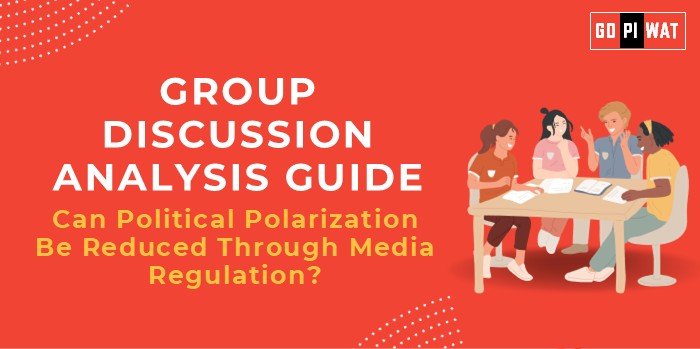📋 Group Discussion Analysis Guide
🌐 Can Political Polarization Be Reduced Through Media Regulation?
📖 Introduction to the Topic
Opening Context: Political polarization, a defining issue of contemporary democracies, poses challenges to social cohesion and governance. Media regulation is increasingly debated as a means to mitigate divisive narratives and misinformation.
Topic Background: The rise of echo chambers and disinformation campaigns, particularly through social media, has intensified polarization globally. Governments and international organizations are exploring regulatory frameworks to counteract these effects without infringing on free speech.
📊 Quick Facts and Key Statistics
- 🌍 Social Media Usage: Over 4.9 billion active users globally (2024), showcasing the massive influence of digital platforms.
- 📈 Political Polarization Index: Countries like the U.S. have seen a 40% rise in polarization metrics over the last decade (Pew Research).
- 💸 Media Misinformation Cost: Estimated global economic damage of $78 billion annually due to fake news (University of Baltimore, 2023).
- 📜 Regulation Examples: The EU’s Digital Services Act (2022) and its impact on platform accountability.
🔗 Stakeholders and Their Roles
- Governments: Implement policies to curb fake news while preserving freedom of expression.
- Social Media Platforms: Develop algorithms and content policies to reduce inflammatory content.
- Civil Society Organizations: Advocate for transparency and monitor the effects of media regulations.
- Citizens: Participate in digital literacy initiatives to discern reliable information sources.
🏆 Achievements and Challenges
✅ Achievements:
- EU’s Digital Services Act: Enhanced accountability of tech platforms, with a 25% reduction in flagged misinformation content.
- Fact-Checking Initiatives: Organizations like PolitiFact and Alt News have gained traction in countering fake news.
- Education Campaigns: Increased public awareness, with digital literacy programs in Finland showing a 50% improvement in identifying false information.
⚠️ Challenges:
- Balancing free speech and regulation—critics argue overregulation stifles public discourse.
- Enforcement disparities—countries with weak institutions struggle to implement and monitor regulations effectively.
- Misinformation adapts rapidly—bad actors find new ways to spread divisive content despite regulatory measures.
🌍 Global Comparisons:
- Success: Finland leads in media literacy and polarization control due to robust education systems.
- Struggles: Countries like Brazil face polarization due to platform misuse during elections.
📖 Case Study:
India’s draft IT rules for regulating content on platforms like WhatsApp and Facebook highlight a push for transparency but also spark debates about censorship.
⚖️ Structured Arguments for Discussion
- Supporting Stance: “Media regulation, as seen in the EU, has effectively reduced misinformation by 25%, showing its potential to address political polarization.”
- Opposing Stance: “Overregulation risks infringing on free speech, as evidenced by debates surrounding India’s IT rules.”
- Balanced Perspective: “While media regulation can reduce polarization, its effectiveness depends on fair implementation and citizen engagement.”
🗨️ Effective Discussion Approaches
- Opening:
- Reference Finland’s success with media literacy programs.
- Begin with statistics highlighting the economic and social costs of polarization.
- Cite a relevant case study, such as the EU Digital Services Act.
- Counter-Argument Handling:
- Present evidence of balanced frameworks like fact-checking partnerships.
- Highlight ongoing challenges in overregulated environments and propose solutions like algorithm transparency.
📈 Strategic Analysis of Strengths and Weaknesses
- Strengths: Media regulation curbs misinformation, fosters accountability.
- Weaknesses: Risks to free speech, potential misuse by authoritarian regimes.
- Opportunities: Collaboration with tech companies to design ethical algorithms.
- Threats: Technological advancements in AI-generated misinformation.
🎓 Connecting with B-School Applications
- Real-World Applications: Suitable for projects on governance, ethics, and digital transformation in MBA programs.
- Sample Interview Questions:
- “What role does digital literacy play in reducing political polarization?”
- “Can tech companies self-regulate to address polarization?”
- Insights for B-School Students:
- Explore frameworks for ethical leadership in regulating information.
- Study the interplay between governance and private platforms in shaping public opinion.


